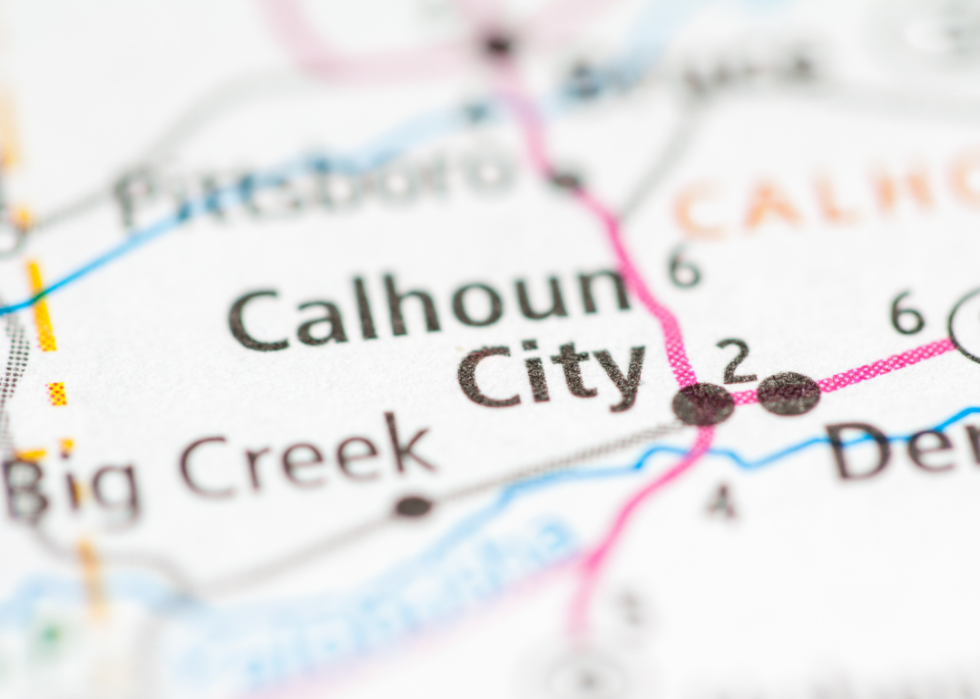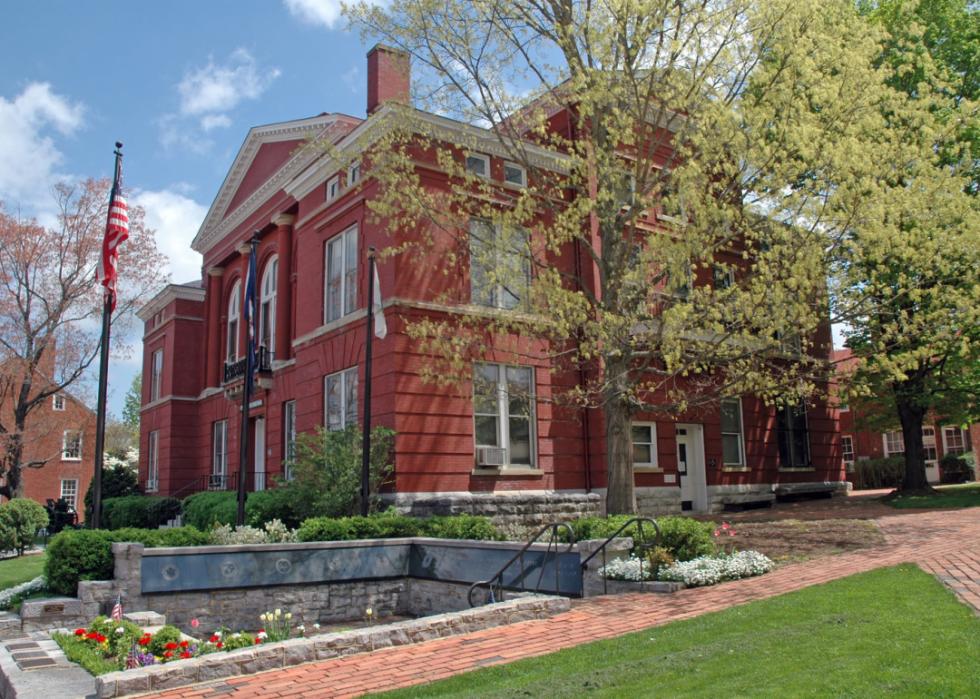
The 25 counties with the least access to mental health care in the nation
The 25 counties with the least access to mental health care in the nation
The country's mental health is taking center stage in the minds of Americans as the worst of the COVID-19 pandemic fades into the background.
In the U.S., 53% of adults said mental health was their top health concern, according to an Ipsos poll published this fall. They join residents of 30 other countries polled by Ipsos reporting similar concerns about health in their nations. That increase in concern is, in part, a result of the traumatic, isolating effects of the pandemic heightening the attention Americans pay to their own mental health, experts say.
"You have an increased awareness of the importance of it, you have an increase in people seeking it, and you now have an increased number of people realizing they're having challenges accessing it," Texas Counseling Association president Katherine Bacon, who holds a doctorate in counselor education, told Stacker.
It's a challenge felt most acutely by about 30% of the U.S. population which lives in an area with a federally designated shortage of mental health providers, according to the Department of Health and Human Services.
To identify areas of the country most in need of solutions for expanded mental health care access, Stacker analyzed data from the Centers for Medicare & Medicaid Services, the Census Bureau, and the Centers for Disease Control and Prevention to rank the counties with the least access to mental health care in the U.S.
For Alaska and Louisiana, "county" is used to denote boroughs and parishes, respectively. Counties are ranked by those that had the largest ratio of residents for every mental health care provider. This analysis includes statistics on each county's uninsured population and the number of poor mental health days per month that residents report, though they did not factor into the ranking.
Counties in Texas make up roughly 1 in every 4 of the top 25 counties in the country with the fewest mental health care providers for the population residing there. But it's hardly unique. Other states with large rural regions also rank poorly for access to mental health care, according to CMS data. Even in urban areas, those seeking mental health support can face difficulty finding a practitioner close enough to visit between work shifts or family responsibilities, as well as difficulty securing consistent transportation.
Access to care isn't just a problem for a few. Nearly 1 in 5 Americans lives with a mental health condition of some sort in any given year, according to mental health advocacy nonprofit Mental Health America. Nearly half of U.S. residents will meet the criteria of having a diagnosable mental health condition in their lifetimes.
Groups like Bacon's Texas Counseling Association are advocating at the state level for measures that would expand access to mental health care resources in the wake of a pandemic that emphasized its importance for millions. The Texas association is especially interested in ways to increase the shortage of professionals in the mental health care space, which Bacon identifies as the biggest challenge for accessing care.
That begins, she said, with shoring up insurance reimbursement rates so that practitioners can expect to earn a living wage. Whether the patient is covered by private insurance, Medicare, or Medicaid, the insurer often doesn't cover the full cost for behavioral health care expenses, leaving underpaid providers to absorb those costs, Bacon said. Some providers even refuse to join insurance networks as "in-network" providers because those networks don't compensate them enough for their care.
But the group is also advocating for its state to join a compact that allows mental health professionals licensed elsewhere to practice in other member states through telehealth programs. The Counseling Compact requires legislative approval to join and is aimed at expanding access and providing more opportunities for counselors to maximize earnings. It's made up of 31 member states (as of Dec. 13, 2023), including several with counties featured in the top 25 worst for access such as Georgia, Alabama, and Tennessee.
In places where broadband access is sufficient, telehealth can expand access to mental health care tremendously, Bacon said. "The more research that comes out on the effectiveness of telehealth, the more we see it's comparable to in-person."
In addition to high demand and low supply of professionals providing this care, the cost of care can be insurmountable for residents who lack any health insurance. Many of the counties that have the least access to mental health care professionals also have higher-than-average rates of uninsured residents. Across all counties, an average of 11.7% of residents report being uninsured, according to the Census Bureau.
A 2018 study from the National Council for Mental Wellbeing suggested that there are more barriers to mental health care that are prevalent across the country besides a lack of access to professional help, including social stigmas, high costs, insufficient insurance coverage, and a lack of awareness about resources.
For people struggling to find a provider accepting clients nearby, Bacon recommends seeking out the nearest state-funded Local Mental Health Authority, which can provide mental health care services in addition to so-called "wraparound" services like financial assistance for medications.
Read on to see which counties are feeling the effects of the behavioral health specialist shortage most acutely.

#25. Bacon County, Georgia
- There are 11,079 residents for every mental health care provider
- Residents report an average of 6 poor mental health days per month
- About 19% of residents lack health insurance

#24. Overton County, Tennessee
- There are 11,420 residents for every mental health care provider
- Residents report an average of 6.1 poor mental health days per month
- About 12% of residents lack health insurance

#23. Chambers County, Alabama
- There are 11,514 residents for every mental health care provider
- Residents report an average of 5.8 poor mental health days per month
- About 13% of residents lack health insurance

#22. Marshall County, Illinois
- There are 11,663 residents for every mental health care provider
- Residents report an average of 4.7 poor mental health days per month
- About 7% of residents lack health insurance

#21. Terry County, Texas
- There are 11,754 residents for every mental health care provider
- Residents report an average of 4.8 poor mental health days per month
- About 26% of residents lack health insurance

#20. Lawrence County, Mississippi
- There are 11,812 residents for every mental health care provider
- Residents report an average of 5.4 poor mental health days per month
- About 15% of residents lack health insurance

#19. Little River County, Arkansas
- There are 11,944 residents for every mental health care provider
- Residents report an average of 5.8 poor mental health days per month
- About 9% of residents lack health insurance

#18. Dawson County, Texas
- There are 12,413 residents for every mental health care provider
- Residents report an average of 4.8 poor mental health days per month
- About 23% of residents lack health insurance

#17. Choctaw County, Alabama
- There are 12,533 residents for every mental health care provider
- Residents report an average of 6.1 poor mental health days per month
- About 13% of residents lack health insurance

#16. Macon County, Tennessee
- There are 12,850 residents for every mental health care provider
- Residents report an average of 6 poor mental health days per month
- About 13% of residents lack health insurance

#15. Calhoun County, Mississippi
- There are 13,018 residents for every mental health care provider
- Residents report an average of 5.6 poor mental health days per month
- About 18% of residents lack health insurance

#14. Buffalo County, Wisconsin
- There are 13,302 residents for every mental health care provider
- Residents report an average of 4.5 poor mental health days per month
- About 8% of residents lack health insurance

#13. Osage County, Missouri
- There are 13,379 residents for every mental health care provider
- Residents report an average of 4.8 poor mental health days per month
- About 12% of residents lack health insurance

#12. Newton County, Indiana
- There are 13,808 residents for every mental health care provider
- Residents report an average of 5.2 poor mental health days per month
- About 12% of residents lack health insurance

#11. Walthall County, Mississippi
- There are 13,836 residents for every mental health care provider
- Residents report an average of 5.7 poor mental health days per month
- About 16% of residents lack health insurance

#10. Hamilton County, Florida
- There are 13,993 residents for every mental health care provider
- Residents report an average of 5.8 poor mental health days per month
- About 16% of residents lack health insurance

#9. Callahan County, Texas
- There are 14,115 residents for every mental health care provider
- Residents report an average of 4.8 poor mental health days per month
- About 19% of residents lack health insurance

#8. Jeff Davis County, Georgia
- There are 14,872 residents for every mental health care provider
- Residents report an average of 6.1 poor mental health days per month
- About 21% of residents lack health insurance

#7. Jefferson County, Georgia
- There are 15,524 residents for every mental health care provider
- Residents report an average of 5.9 poor mental health days per month
- About 18% of residents lack health insurance

#6. Osage County, Kansas
- There are 15,768 residents for every mental health care provider
- Residents report an average of 4.7 poor mental health days per month
- About 10% of residents lack health insurance

#5. Haywood County, Tennessee
- There are 17,694 residents for every mental health care provider
- Residents report an average of 5.8 poor mental health days per month
- About 14% of residents lack health insurance

#4. Burleson County, Texas
- There are 18,051 residents for every mental health care provider
- Residents report an average of 4.6 poor mental health days per month
- About 20% of residents lack health insurance

#3. Jones County, Texas
- There are 19,873 residents for every mental health care provider
- Residents report an average of 4.5 poor mental health days per month
- About 19% of residents lack health insurance

#2. Hutchinson County, Texas
- There are 20,495 residents for every mental health care provider
- Residents report an average of 4.8 poor mental health days per month
- About 20% of residents lack health insurance

#1. Rockbridge County, Virginia
- There are 22,641 residents for every mental health care provider
- Residents report an average of 4.9 poor mental health days per month
- About 10% of residents lack health insurance
Story editing by Ashleigh Graf. Copy editing by Tim Bruns.



